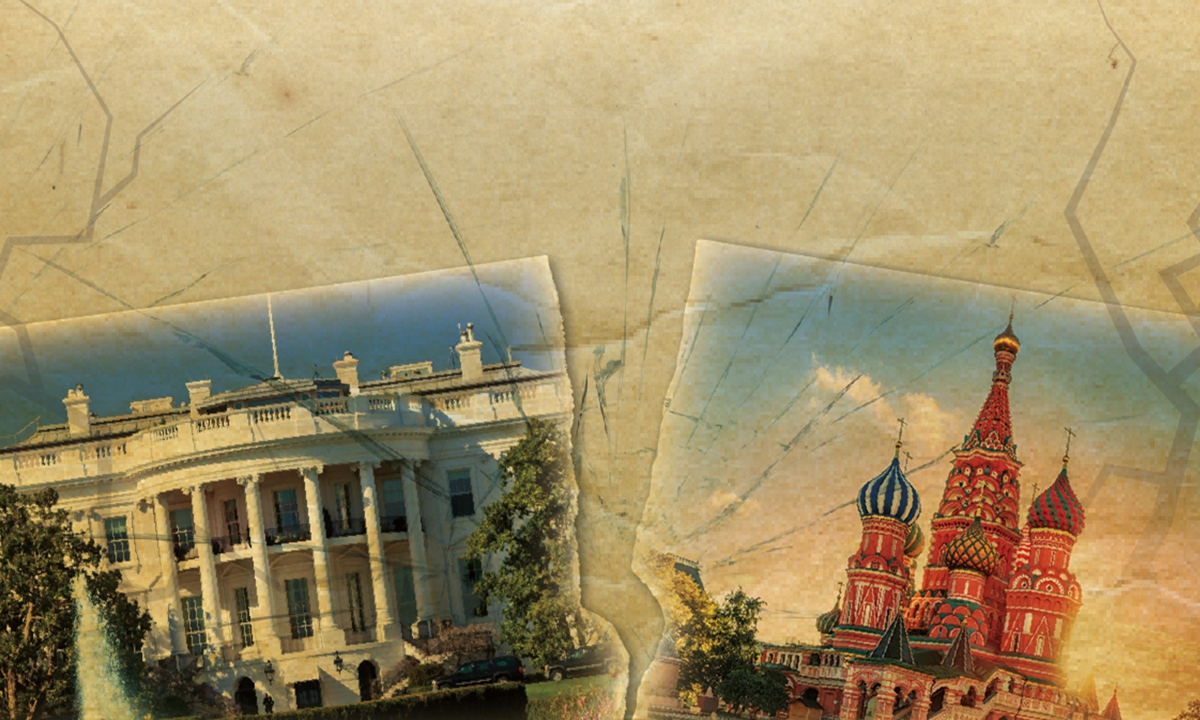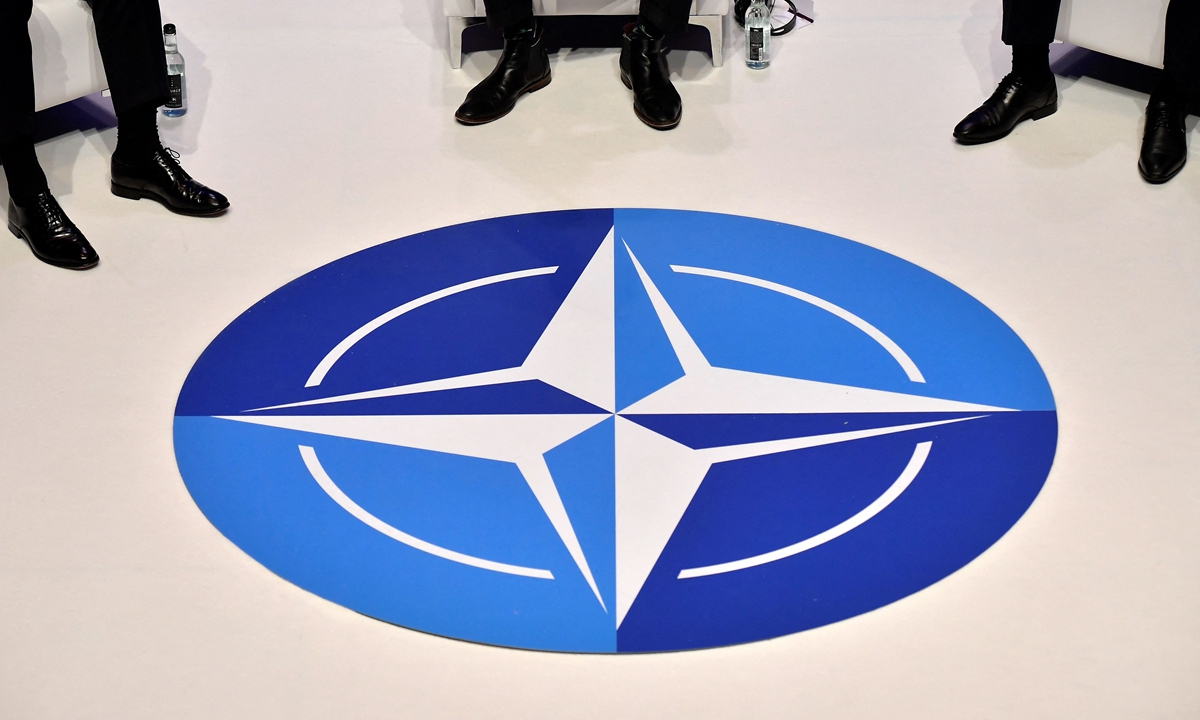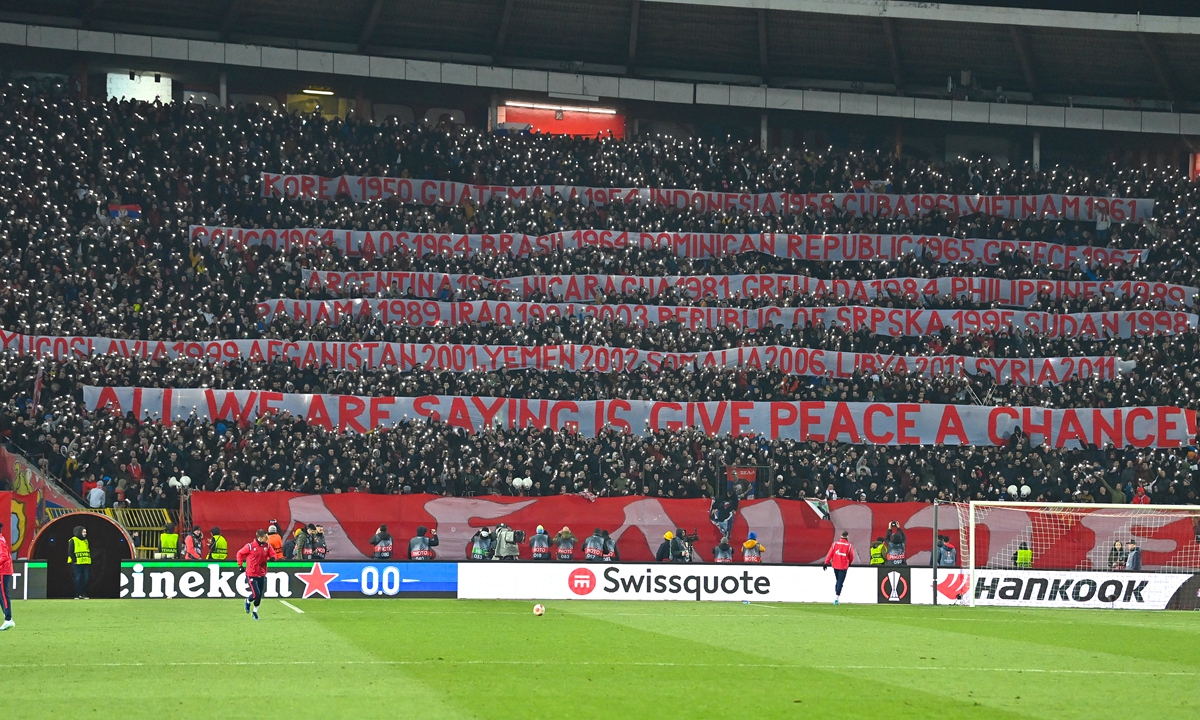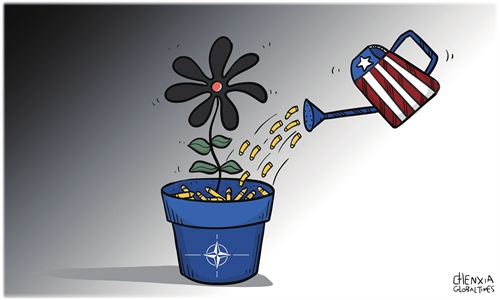OPINION / GLOBAL MINDS
What would George Kennan say about Russia-Ukraine conflict?

Washington and Moscow
Editor's Note:Since the tension between Russia and Ukraine escalated, former US diplomat George Kennan's warning about NATO's expansion has once again gained people's attention. What was Kennan's general view on NATO? Why did Washington pay no regard to his warning? What would he think about the ongoing Russia-Ukraine conflict if he were alive today? James Peck (Peck), a US scholar and adjunct professor of history at New York University, talked about these issues with Global Times (GT) reporter Xia Wenxin via email. Peck was the editor of three of Kennan's books in the 1980s.
GT: How did you begin working with Kennan? What were the three books you worked on with Kennan about? Are the ideas in these books different from Kennan's in his earlier years?
Peck: I first met George Kennan in 1980 when one of my authors recommended that he consider me as his editor. His literary agent, who I knew well, thought that was a great idea. Since the book was to be a collection of essays, he sent me a list of possible articles for my advice. A week later I went to his office for our first meeting. He looked me over, then returned to my suggested list, and finally said: "Mr. Peck I see you have not included either 'The Long Telegram' or my Mr. X article from the 1940s that has long been so controversial about containment. You are one of the very few who does not want too - and I am very relieved at that fact."
Rather than start with the decades of controversy over those views, his deepest concerns when I met him appeared to be how the US-Russian relationship and the increasing nuclear peril were both spiraling out of control - and doing so in ways he thought highlighted the inability of the US to wisely handle relations with Moscow. When I said approximately this, he nodded his agreement and said he'd soon write an introduction covering such points. A few weeks later he called and asked if I could stop by his house and pick it up. Since my wife was then teaching at Princeton and we lived a few blocks away, I drove over. After welcoming me and talking for a few minutes, he handed me a 40-page introduction. I said, of course, I would get back to him very quickly. But Kennan said, "Why don't you just sit right here and read it while I pace back and forth, an old habit I developed in the diplomatic corps when I dictated dispatches. So please do an initial reading while I pace back and forth." Fortunately, I'm a rapid reader, but even so, to read 40 pages, and to consider what I thought of the piece as well as how to phrase my reaction to it, certainly created a demanding moment. He evidently liked my suggestions and we ended up having a long and interesting conversation. It was the first of quite a few.
As the publication date neared, we still needed a title. Kennan, a master stylist, and probably the best writer ever to come out of the American diplomatic establishment, said he was just not sure what it should be. Then calling me one day unexpectedly from his place in Norway he immediately asked - do you think we should call the book "The Nuclear Illusion" or "The Nuclear Delusion." I said an "illusion" suggests something is being misperceived, while a delusion is a dangerously deceptive idea. Didn't his underlying concerns point to more than US misperceptions? "Indeed," he replied. And so the title became The Nuclear Delusion: Soviet-American Relations in the Atomic Age.
The second book was The Fateful Alliance: France, Russia, and the Coming of the First World War. Underlying his depiction of the diplomatic maneuverings of the time, he zeroed in on the forces that led to such a war - the growth of military-technological capabilities far in excess of there being any rational use of them; the emergence of military establishments compelled to deal with hypothetical military contexts divorced from any political background; leaders preoccupied with figuring out how wars could be "won," not how they could be avoided or limited.
Along with reissuing the two volumes of his memoirs, our final work together was Sketches from a Life. Written originally as an impressionistic record of his travels, it covers seven decades of his life. My work included reading his still restricted papers to discuss what to include. They reveal a great deal about his sensibilities, the ways he felt at home in European culture, and his own uneasiness with the lack of cultural sophistication in the US, its rather tawdry business society, and the ways it was driven by a highly superficial mass media.

NATO File Photo: VCG
GT: Kennan is known as the "architect of America's containment of the Soviet Union." He was present at the creation of NATO and witnessed the development of the military alliance. Can you elaborate on how Kennan viewed NATO's eastward expansion after the collapse of the Soviet Union? In his opinion, what kind of organization should NATO have been, as to ensure a stable relationship between the West and Russia?Peck: The key to understanding George Kennan's view of NATO goes back to why he always opposed its creation and development. Yes, his "Long Telegram" sent from Moscow in 1946 and his Mr. X piece in Foreign Affairs in 1947 made him publicly the architect of America's containment of the Soviet Union. Kennan, however, believed containment should be political, economic, and ideological (and he included in the political category, covert operations in which he himself was quite involved) - but not military. He repeatedly said, then and throughout his life, that he never felt the Russians were about to militarily invade Western Europe.
Kennan was certainly a strong advocate of the Marshall Plan. He considered it essential to build up the Western European economies and undermine the influence of local Communist parties. But when the idea of NATO arose, as head of the Policy Planning Board of the State Department, he strongly opposed it. Why? Because NATO meant a permanently divided, militarized Europe and the creation of West Germany as a permanent state. The result would leave no room for any plausible settlement over the long haul with the Russians which he thought possible - and ultimately necessary. He went public in his lectures on the BBC in the mid-1950s when he called for a neutral, united, demilitarized, Germany.
With this background, we see why Kennan was so appalled by NATO's expansion to the East in the 1990s. Kennan wanted to find ways to welcome Russia into a European world. It would take time, he said; it would be difficult. But none of this would happen with the extension of NATO to the East. The issues he had had with NATO all along - its militarized thinking, the tendency to demonize Russia as an "enemy," a pronounced tendency to think in terms of military power instead of more underlying issues - all this entailed an American inability to be open to the historic possibilities for a different relationship between Russia and Europe. "No one was threatening anybody else," he said. "Expanding NATO would be the most fateful error of American policy in the entire post-Cold War US," he wrote in February 1997. It would "inflame the nationalistic, anti-Western tendencies in Russian opinion," "restore the atmosphere of the cold war to East-West relations," and make it much more difficult, if not impossible, to achieve further reductions of nuclear weaponry.
Thus Kennan wanted a NATO, if such there still had to be, to be a system that would somehow include Russia, and certainly not even implicitly aim at a future likely enemy. "Why, with all the hopeful possibilities engendered by the end of the Cold War, should East-West relations become centered on the question of who would be allied with whom and, by implication, against whom in some fanciful, totally unforeseeable and most improbable future military conflict?"
GT: Can you tell us more about Kennan's later life? How well were his opinions received in US society and government in those years?
Peck: In his later years, Kennan's public profile and reputation were actually quite high, even as his views were ignored in government circles. In part, this was because his concerns tapped into a deepening public unease with a renewed Cold War with Russia and the anti-nuclear bomb and missile deployment issues in the 1980s. In addition, he was in the forefront of those warning of "ecological disaster" from which "there can be no real recovery if the issue was not confronted in the coming decades."
In all of this, Kennan was not completely out of sync with some sectors of public opinion. As with others, he was deeply shaken by the continuing escalation of the nuclear arms race. (He had opposed the US decision to build the H bomb in 1950 and had called then for a policy of no first strike in the use of nuclear weapons). He spoke out strongly about the growing "anti-Soviet hysteria" in those years and argued that Washington and too many Americans had a "subconscious need on the part of a great many people for an external enemy — an enemy against whom frustrations could be vented, an enemy who could serve as a convenient target for the externalization of evil, an enemy in whose allegedly inhuman wickedness one could see the reflection of one's own exceptional virtue." Nor was he entirely alone in insisting on the "limits of American power."
Early on when I knew him, he turned to me once at lunch, and with his very direct style, asked: "Do you know what Acheson's problem was?" referring to Truman's Secretary of State. "He didn't understand power."
What he was speaking of, he explained, was the extraordinary hubris he saw in Washington's belief from shortly after the end of World War II that it could construct a global system that would control its allies (especially Germany and Japan) in ways that would allow it to confront its enemies as part of a virtually permanent system of power.
To Kennan, who thought in terms of decades, such a pursuit was delusional. He pointed to what he had written in 1947, a conviction evident in the years to come: "I doubt the ability of any country so conceived and so organized as our own to handle successfully for any length of time the problems of great peoples other than our own." In the end, he reiterated to me, Washington would find itself no more able to prevent the emergence of independent centers of power in Europe and Japan and elsewhere than the Russians had in Eastern Europe. Nor should it wish to do so.

During the UEFA Europa League Round of 16 second leg football match between Red Star Belgrade and Glasgow Rangers at the Rajko Mitic Stadium, in Belgrade,Serbia, on Thursday, thousands of Serbian soccer fans displayed five huge banners listing over 20 countries which have been invaded by the US and NATO. Photo: AFP
GT: Kennan once called the expansion of NATO "the most fateful error of American policy in the entire post-Cold-War era" that could lead to a series of disasters. Yet, the White House has ignored his warning (in fact, not only over NATO's expansion, but also many other issues like the Iraq War). Did he ever complain to you about this? In your opinion, why did the US and NATO turn a blind eye to Kennan's opinions?Peck: Yes, it is certainly true, though, that the White House dismissed Kennan's views about where US policy was heading in the post-Cold War era. He had opposed the 1990 Iraq War - and the Vietnam War before that. But it is important to note that Kennan was not completely alone in his criticisms. A number of highly prominent cold warriors from his generation followed up his February 1997 condemnation of the expansion of NATO in the New York Times with their own statement in June which called the NATO expansion "neither necessary nor desirable." It was "a policy error of historic proportions... We believe NATO expansion will decrease allied security." And the statement concluded: "This ill-conceived policy can and should be put on hold." Its supporters included former Ambassador Jack Matlock, Robert McNamara, Paul Nitze, former CIA Director Stansfield Turner, former secretary of the army Stanley Reeser, Senators Nunn, Hatfield, Bradley, and numerous other well-known first-generation Cold Warriors.
What this divide of older and newer foreign policy advisors highlighted the coming to power of a new, younger generation of government foreign policy advisors who embraced a fervent unipolar vision of the world, one that fully blossomed in the Clinton years and has continued ever since. The issue after Vietnam was partly about just how much the US really could effectively "transform" other nations - and whether (as the 1992 Pentagon Draft Policy proposal leaked in 1992 underlined) the US could realistically continue what it saw as its "preeminent responsibility," as it undertook to "prevent the re-emergence of a New Rival." In this context, the US would continue to "preserve NATO... as the channel for U.S. influence and participation in European security affairs." Kennan was appalled.
Far earlier than those former establishment leaders who spoke out against NATO expansion in 1997, Kennan never believed that the US could or should try to run the planet. Kennan, often seen as America's grand strategist par excellence, used the term once or twice in the 1940s, but largely objected to its use in the 80s and thereafter. As Kennan remarked to me, what he was seeing was neither very grand nor very impressive strategizing. Indeed, he argued that what was emerging in Washington was a rationalizing gloss over an increasingly irrational effort to be the center of a vastly expanding global dynamic that would lead to ultimately tragic results. Being the pivot in every region, "managing" the rules of the game, expanding NATO to Russia's borders, insisting on US values as universal - all this was a flight from the limits of power Kennan spoke of throughout his life. Coherent strategic thinking, he repeatedly said, had become almost impossible given the US refusal to confront the need to both limit US power and become open to pressing globally threatening problems.
GT: In an interview with the New York Times in 1998 after the US Senate ratified NATO expansion, Kennan said it was "the beginning of a new cold war." Now the cold war has turned into a hot one. If Kennan were still alive and witnessed the escalation of the Russia-Ukraine conflict, what would be his reaction? How would he evaluate the current situation?
Peck: It's impossible, of course, to know what strong and eloquent words Kennan would have chosen to deplore what he would have seen as the dangerous, unthoughtful, and reckless American behavior evident in how NATO and Ukrainian issues had been dealt with for so many years. But let me suggest some perspectives he almost certainly would have brought to bear on this situation.
First, Kennan had a strong grasp of key aspects of Russian history and the need to take those into account for any coherent US policies. Kennan would have deplored the invasion of Ukraine, but he would have had a strong sense of why it happened and the underlying responsibility of the US for it.
Second, he might have reminded Americans that "no country ever understands perfectly another country's affairs; and none is likely to do much good by interfering in them." In the late 80s, he thought there was an historic opening for a non-militarized Europe. He argued for a compassionate response to the problems of Russia - "let us wish them all well, and be helpful where we can. But let us not make ourselves part of the problem." Of course, to his great regret, that is exactly what he saw the US was doing with NATO - and he would have tried to explain why.
Third, he would have undoubtedly expressed alarm about the risk of events today getting completely out of hand, all those dangers of disaster by inadvertence, by human error, by computer failure, by misread signals - all these compounded by the possible use of nuclear weaponry.
Fourth, he would likely have reiterated his strong criticisms about how and why American leaders seemed incapable of understanding why Russian policies were so often deeply affected by the way the US treated them, a problem always exacerbated by the ways he saw Americans and the American elite requiring "an enemy."
Fifth, he likely would have reiterated his strong criticisms of the commercialized American mass media "whose dedication is to the oversimplification and dramatization of reality rather than the education of the public to the recognition of bitter complexities."
Sixth, apart from immediate issues, Kennan would almost surely have reiterated the folly of such US policies in the midst of humanity's existential crises of climate and nuclear peril.
In the late 1980s in reviewing Washington's endless series of distortions of Russia, the dehumanization of its leaders, the "reckless application of the double standards to the judgment of Soviet conduct and ours," the underlying implication that the conflict was ultimately an "irreconcilable one," he offered a stark reflection on what such views said about the American government. "These, believe me, are not the marks of maturity and discrimination one expects of the diplomacy of a great power; they are the marks of intellectual primitivism and naivety unpardonable in a great government. I use the word naivety because there is naivety of cynicism and suspicion, just as there is a naivety of innocence."
What is happening now would hardly have changed his conclusion.

